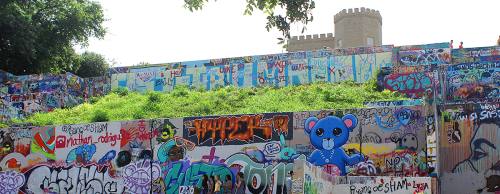News of a quick, seemingly noncontroversial vote during a Monday evening Historic Landmark Commission meeting swept the state of Texas and went on to become one of the most trafficked stories in Community Impact Newspaper history.
How? Well, the devil is in the details.
Although the vote’s result meant the demolition of a beloved Austin art attraction—the HOPE Outdoor Gallery, colloquially known as “Graffiti Park”—the agenda item went entirely unnoticed by other local media outlets—and even some of the appointed commissioners.
Monday night’s Historic Landmark Commission meeting included several postponements and a 15-item consent agenda, or a group of cases voted on and approved at once without discussion or explanation of the vote by commissioners.
As the Austin City Hall Reporter, part of my weekly routine is to run through the meeting agendas, highlighting any items of interest and making calls to understand what actions could occur.
When it came to Monday’s Historic Landmark Commission agenda, I noticed the description for item C.
NRD-2018-0002 — Offered for Consent Approval
1012 Baylor Street
Council District 9
Proposal: Demolish concrete walls and slabs at Graffiti Park
Applicant: JB Cumby Construction
City Staff: Steve Sadowsky, Historic Preservation Office 974-6454
Staff Recommendation: Release the permit upon completion of a City of Austin Documentation Package.
The words “Graffiti Park” immediately piqued my interest. However, it was not new news to learn the outdoor gallery was going away—coverage for this dates back to late November.
Nonetheless, I published an update story at 4:01 p.m. alerting readers about the site’s pending demolition approval. The story instantly went viral, drawing traffic not normally seen at Community Impact, a print-first monthly news outlet.
The commission voted 8-0 to approve the demolition without a discussion. After updating my story at 10 p.m., traffic increased so drastically that our company website temporarily crashed. The story swept through the state, and outlets from the Houston Chronicle to KVUE cited Community Impact Newspaper’s original story in their coverage.
One commissioner told me after the meeting they did not realize what they were voting on until after it was entered and did not believe the other commissioners were aware of the implications of their votes.
“The devil is in the details,” may be a cliché, but it is our attention to those details that make local journalism so important to communities. Those details—often overlooked by the public, the media and sometimes even by elected officials—are where some of the most important stories are born.
Read the story here.
Select your community
Become an InCIder
News
- Austin Metro
-
Houston Metro
- Houston Metro Home
- Bay Area
- Bellaire | Meyerland | West University
- Conroe | Montgomery
- Cy-Fair | Jersey Village
- Cypress
- Heights | River Oaks | Montrose
- Katy | Fulshear
- Lake Houston | Humble | Kingwood
- New Caney | Porter
- Pearland | Friendswood | Manvel
- Spring | Klein
- Sugar Land | Missouri City
- The Woodlands
- Tomball | Magnolia
- Dallas | Fort Worth Metro
- San Antonio Metro





